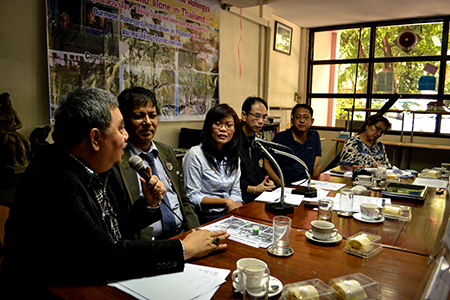
Being a refugee does not make you a criminal, said Dr. Niran Pitakwatchara, from the National Human Rights Commission (NHRC).
Pitakwatchara was one of many academics to speak at “The Rohingya: Unwanted and Alone in Thailand” press conference hosted by the Burmese Rohingya Association in Thailand (BRAT) at the Student Christian Centre (SCC) in Bangkok.
Thousands of Rohingya Muslims have fled from persecution in Burma to Thailand, Malaysia and Indonesia over the past year. They paid smugglers to send them by sea route. Many have been nabbed by Thai authorities and detained in overcrowded temporary holding cells.
“I was concerned that the Rohingya refugees were being deprived of basic rights while under temporary care in Thailand,” Pitakwatchara said.
It’s time for the government to move the displaced refugees to temporary shelters until practical longer-term solutions are found, he said.
"Though Thailand is not a signatory (to the 1951 UN Refugee Convention), relevant ministries could actually expedite their authority in providing decent and appropriate shelters for these people, based on human rights principles in the Thai Constitution… There is adequate religious and community support for the Rohingya while they wait for appropriate durable solutions," Pitakwatchara said.
But “any local communities identified as sites for temporary shelters should be closely consulted before the Rohingya are relocated” he added.
The Thai immigration act allows authorities the discretionary power to move the refugees to a proper place outside of the immigration detention centers. It’s estimated that about 2000 Rohingya are being held in Thailand. At least 86 refugees recently escaped from a holding centre in southern Sadao district, according to police.
Decisions about policies regarding the detainment and treatment of Rohingya refuges need to be decided soon, said Saowanee Khomepatr, director of the Anti-Trafficking in Women and Children division of the Ministry of Social Development and Human Security. When these refugees are separated from their families for long periods the family may become disheartened. In some cases family members have been lured by gangsters to meet up with their families in Malaysia and Indonesia without knowing their relatives are actually being detained in Thailand.
Many Rohingya have fled their country following last year’s violence where human rights abuses at the hands of state authorities and extremist Rakhines has been reported to be ongoing. Those that have left have included many women and children who are particularly vulnerable to exploitation by the smugglers.
“The Yingluck Shinawatra government had promised not to deport the Rohingya against their will, while the previous Democrat administration allowed them to be quietly pushed back at the border. That is one positive policy development in this year,” said Sunai Phasuk, an advisor for Human Rights Watch.
However clear guidelines in dealing with illegal immigrants still needs to be firmly entrenched within Thai law, said Surapong Kongchuntuk, a member of the Human Rights Committee of the Lawyers Council of Thailand.
“Authorities should communicate and coordinate with Thai society to better accommodate the temporary stay of the Rohingya. The Thai government has prepared a set of policies on illegal immigrants, which include the Rohingya, but the National Security Council has dragged this out without launching specific measures," Kongchuntuk said.
Coastal and inland officials shouldn’t deport or push Rohingya refugees back to sea. Strict punishment needs to be given to trafficking syndicates, in particular the uniformed and civilian officials in their ranks, as a stern warning to the would be smugglers, Kongchuntuk said.
The influx of refugees into the neighboring countries has gone from just being a regional problem to becoming an international problem. In order to address it requires both a regional and international approach. If there is any hope of the Rohingya living a life in line with the universal declaration of human rights it will come from this, said U Maung Kyaw Nu, BRAT president
Rohingyas are not economic migrants. They are refugees compelled to flee their homes from an oppressive regime, he said. They should be categorized as such under the UN Convention of Refugee. The treatment of Rohingya by Thai authorities is clearly in violation of universal human rights. They are in need of protection and provision until a viable solution can be found.
No comments:
Post a Comment